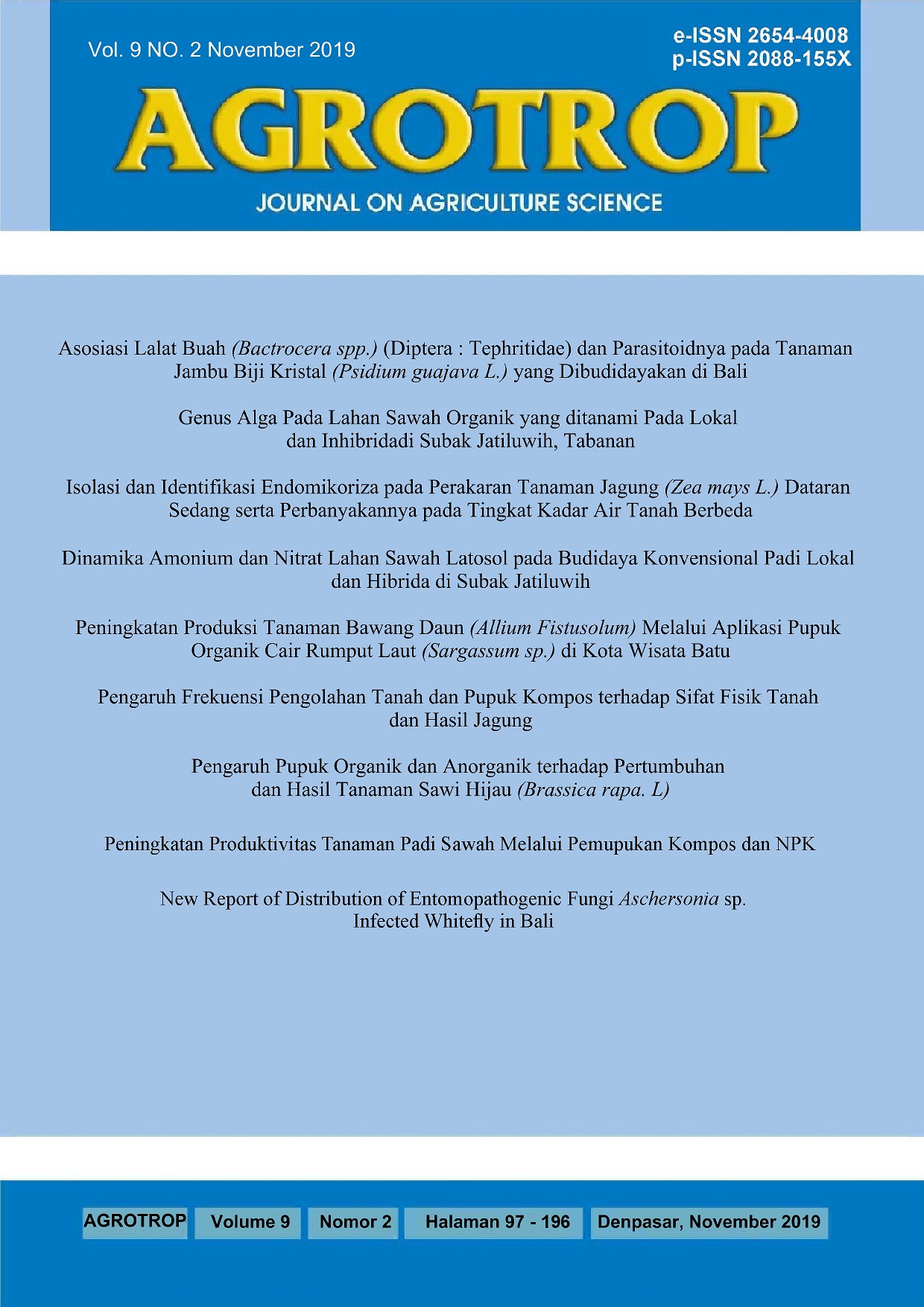Peningkatan Produktivitas Tanaman Padi Sawah Melalui Pemupukan Kompos dan NPK
Abstract
Increased Rice Crop Productivity Through Compost and NPK Fertilization. The aims of this research was to study response of compost and NPK fertilizers to the soil chemical properties and rice yield. The method used was a factorial Randomized Block Design consisting of two factors. The first factor was compost Fertilizer (B) consists of 2 levels, namely: B0 = Without compost fertilizer and B1 = 5 ton compost fertilizer ha-1. The second factors was NPK national recomendation (P) consists of 3 levels, namely: P1 = 50% of NPK recommendation, P2 = 100% of NPK recommendation and P3 = 150% of NPK recommendation. The results showed that the treatment of compost and NPK fertilizers gave no significant effect on tillers number clumb-1 and dry straw weight/m2 , but gave a significant effect on N, P, K and dry grain weight/m2. The combination of 5 tons of compost/ha and 150% of NPK recommendation can produce N-total, P-available level, K-available and dry grain weight per m2 respectively 0.35%, 13.79 ppm, 355, 21 ppm and 0.96 kg and significantly higher than the combination of 50% NPK recommendation and without compost, which were 0.26%, 8.21 ppm, 236.10 ppm and 0.69 kg respectively.
Downloads
References
Hardjowigeno, S. 2003. Ilmu Tanah . Akademika Pressindo. Bogor:
Kasniari, DN dan A.A.N. Supadma. 2007. Pengaruh pemberian beberapa dosis pupuk (N,P,K) dan jenis pupuk alternative terhadap hasil tanaman padi (Oryza sativa L.) dan kadar N, P, K inceptisol Selemadeg, Tabanan. Agritrop 24 (6) : 168 – 176.
Kaya. E. 2014. Pengaruh Pupuk Organik dan Pupuk NPK terhadap pH dan K-tersedia Tanah serta Serapan-K, Pertumbuhan dan Hasil Padi Sawah. Buana Sains Vol. 14 (2) : 113 – 122
Suprihatno, B., Aan A. Daradjat, Satoto, I N. Widiarta, Agus Setyono, S. Dewi Indrasari, Ooy S. Lesmana dan Hasil Sembiring. 2009. Deskripsi Varietas Padi. Balai Besar Penelitian Tanaman Padi. Balai Penelitian dan Pengemangan Pertanian Departemen Pertanian. Sukabumi.
Rachman, Idris Abd. Sri Djuniwati dan Romarudin Idris. 2008. Pengaruh bahan organik dan pupuk NPK terhadap serapan hara dan produksi jagung di Inceptisol Ternate. Jurnal Tanah dan Lingkungan, Vol. 10, No. 1 : 7 - 13
Wasis. B. dan Nuri Fathia. 2010. Pengaruh Pupuk NPk Dan Kompos Terhadap Pertumbuhan Semai Gmelina (Gmelina Arborea Roxb.) Pada Media Tanah Bekas Tambang Emas (Tailing). Jurnal Ilmu Pertanian Indonesia, Vol. 16 (2) : 123-129.
Wahyuni E.S., Saiful, Endang dan W. Pudjiastutik. 2015. Pengaruh Penggunaan Pupuk NPK terhadap Produksi Padi (Oryza sativa L.) Varietas Ciherang. Jurnal Bioshell Vol. 04 (1) : 233 – 242.
Zulkarnain, M, Budi Prasetya dan Soemarno1. 2013. Pengaruh Kompos, Pupuk Kandang, dan Custom-Bio terhadap Sifat Tanah , Pertumbuhan dan Hasil Tebu (Saccharum officinarum L.) pada Entisol di Kebun Ngrangkah-Pawon, Kediri. Indonesian Green Technology Journal.Vol. (1) : 45 – 52.











